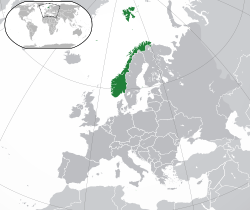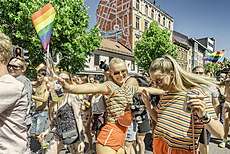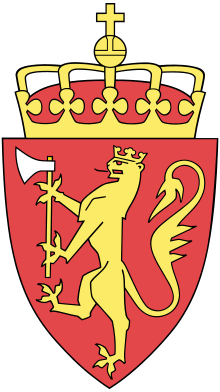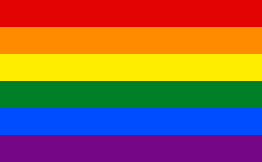LGBT rights in Norway
Norway, like most of Scandinavia, is very liberal in regards to lesbian, gay, bisexual, transgender (LGBT) rights. In 1981, Norway became one of the first countries in the world to enact an anti-discrimination law explicitly including sexual orientation. Same-sex marriage, adoption, and assisted insemination treatments for lesbian couples have been legal since 2009. In 2016, Norway became the fourth country in Europe to pass a law allowing the change of legal gender for transgender people solely based on self-determination.
 | |
| Status | Legal since 1972 |
| Gender identity | Transgender persons allowed to change legal gender |
| Military | LGBT people allowed to serve openly |
| Discrimination protections | Sexual orientation, gender identity/expression, intersex status protections (see below) |
| Family rights | |
| Recognition of relationships | Same-sex marriage since 2009 |
| Adoption | Same-sex couples allowed to adopt |
| Part of a series on |
| LGBT rights |
|---|
 |
| lesbian ∙ gay ∙ bisexual ∙ transgender |
|
Overview
|
|
Organizations
|
|
|
Much like the other Nordic countries, Norway is frequently referred to as one of the world's most LGBT-friendly nations, with high societal acceptance and tolerance of LGBT people. Recent opinion polls have found very high levels of support for same-sex marriage among the Norwegian public.[1]
Legality of same-sex sexual activity
Same-sex sexual activity has been legal since 1972.[2] At the same time of legalization, the age of consent became equal regardless of gender and/or sexual orientation, at 16.[3]
Recognition of same-sex relationships
On 18 November 2004, two MPs from the Socialist Left Party introduced a bill to abolish the existing registered partnership law, and make the marriage law gender-neutral. The move was withdrawn and replaced by a request that the cabinet further investigate the issue. The conservative cabinet of that time did not look into the issue. However, the second Stoltenberg Cabinet announced a common, unified marriage act as part of its foundation document, the Soria Moria statement. A public hearing was opened on 16 May 2007.
On 29 May 2008, the Associated Press reported that two Norwegian opposition parties had come out in favour of the new bill, assuring its passage in the Storting. Prior to this, there were some disagreements with members of the current three-party governing coalition on whether the bill had enough votes to pass.
On 14 March 2008, the Norwegian Government proposed a marriage bill on 14 March 2008 that would give lesbian and gay couples the same rights as heterosexuals, including religious weddings (if the church so chooses), adoption and assisted pregnancies. The first parliamentary hearing was held on 11 June 2008, where the bill was approved by 84 votes to 41. The new legislation amended the definition of civil marriage to make it gender-neutral. Norway's upper legislative chamber (Lagtinget) passed the bill in a 23–17 vote. The King of Norway granted royal assent thereafter. The law took effect on 1 January 2009.[4]
Prior to the gender-neutral marriage law, a registered partnership law had been in effect since 1993. Partnerskapsloven, as it was known in Norwegian, granted many marriage rights to same-sex couples, only without calling it marriage. Since 1991, unregistered same-sex cohabitation has been recognized by the state for the granting of limited rights, such as being considered as next of kin for medical decisions, and in the event of wrongful death of one partner the other partner was entitled to compensation.[5]
In 2014, the Church of Norway's National Council voted down a proposal to perform same-sex marriages in the church.[6] In 2015, it reversed course and voted to allow same-sex marriages to take place in its churches.[7] The decision was ratified at the annual conference on 11 April 2016.[8][9][10]
Adoption and family planning
Married and committed same-sex couples are permitted to adopt under Norwegian law. Stepchild adoption has been allowed for registered partners since 2002.[11] Full adoption rights were granted to same-sex couples in 2009. Additionally, lesbian couples have access to artificial insemination. Pursuant to the same-sex marriage law, when a woman who is married to or in a stable co-habiting relationship with another woman becomes pregnant through artificial insemination, the other partner will have all the rights and duties of parenthood "from the moment of conception".
Military status
Lesbian, gay and bisexual people can serve openly in the Armed Forces. They have had full rights and anti-discrimination protections since 1979.[12][13] Transgender persons may serve openly as well.[14]
Discrimination protections and hate crime laws
In 1981, Norway became the first country in the world to enact a law to prevent discrimination against LGBT people by amending Paragraph 349a of its Penal Code, prohibiting discrimination based on sexual orientation in the provision of goods or services and in access to public gatherings. In the same year, Paragraph 135a of the Penal Code was amended to prohibit hate speech on account of sexual orientation.[15] The country has banned discrimination based on sexual orientation in employment since 1998. Norway also has a law prohibiting discrimination based on gender identity and expression since 2013,[16] and is one of the few countries in the world to explicitly protect intersex people from discrimination.[17]
Section 5 of the Act on the Prohibition of Discrimination on the grounds of Sexual Orientation, Gender Identity and Gender Expression (Norwegian: Lov om forbud mot diskriminering på grunn av seksuell orientering, kjønnsidentitet og kjønnsuttrykk), enacted in 2013, states as follows:[18]
Discrimination on the basis of sexual orientation, gender identity or gender expression shall be prohibited. The prohibition shall apply to discrimination on the basis of actual, assumed, former or future sexual orientation, gender identity or gender expression.
"Discrimination" shall mean direct and indirect differential treatment that is not lawful, [...], and that is due to sexual orientation, gender identity or gender expression.
Bias-motivated violence and speech
According to a 2013 survey entitled "Sexual orientation and living conditions" (Seksuell orientering og levekår) from the University of Bergen, nine out of ten LGBT respondents reported not being exposed to discrimination or harassment at the workplace. In addition, only a small minority stated they had been physically assaulted, and suicide among LGBT people has significantly decreased since the 1990s. Nevertheless, homosexual boys reported a six times higher occurrence of bullying in schools than heterosexual boys.[19]
According to the Oslo Police District, 238 bias-motivated crimes had occurred in Oslo in 2018, of which 20 percent related to LGBT status; the remaining relating to ethnicity (57%), religion (17%), disability (3%) or anti-Semitism (3%).[20]
The Norwegian Institute of Social Research reported in 2019 that LGBT people were more at risk of experiencing hate speech. 15% of LGBT respondents reported having been the target of personal threats, mostly online, compared to 4% among the general population.[19]
Transgender rights
On 18 March 2016, the Solberg Government introduced a bill to allow legal gender changes without any form of psychiatric or psychological evaluation, diagnosis or any kind of medical intervention, by people aged at least 16. Minors aged between 6 and 16 also may also transition, but require parental consent.[21][22][23] The bill was approved by a vote of 79-13 by Parliament on 6 June.[24][25] It was promulgated on 17 June and took effect on 1 July 2016.[23][26] One month after the law took effect, 190 people had already applied to change their gender.[27]
Intersex rights
Intersex infants in Norway may undergo medical interventions to have their sex characteristics altered. Human rights groups increasingly consider these surgeries unnecessary and, they argue, should only be performed if the applicant consents to the operation. A 2019 survey from the Oslo University Hospital showed that two out of three medical professionals were willing to perform such surgeries, and parents were overall supportive of the move.[28] In March 2019, the Norwegian Directorate for Children, Youth and Family Affairs published two reports, recommending postponing such medical interventions on intersex infants until they are able to consent.[29]
Conversion therapy
In 2000, the Norwegian Psychiatric Association overwhelmingly voted for the position statement that "homosexuality is no disorder or illness, and can therefore not be subject to treatment. A 'treatment' with the only aim of changing sexual orientation from homosexual to heterosexual must be regarded as ethical malpractice, and should have no place in the health system".[30]
As of December 2019, the Storting is considering a ban on conversion therapy.[31]
Health and blood donation
In Norway, as in many other countries, men who have sex with men (MSM) were previously not allowed to donate blood. In June 2016, the Norwegian Directorate for Health and Social Affairs announced it would make an end to this ban, and implement a 12-month deferral period instead, whereby MSM applicants would be permitted to donate provided they had not had sex in a year.[32] The new 1 year deferral period was implemented on 1 June 2017.[33]
In October 2016, Minister of Health and Care Services Bent Høie made the announcement that the HIV-prevention drug, PrEP, would be offered free of charge as part of Norway's health care system.[34][35][36]
Living conditions



Norway is very gay-friendly.[37] The most open and inclusive community can be found in the capital, Oslo, where many gay-friendly events and venues are located including the Raballder Sports Cup and the Oslo Pride Festival.[38] Other events include the Scandinavian Ski Pride held in Hemsedal, Trondheim Pride held in Trondheim and Bergen Pride (Regnbuedagene) in Bergen.[39] 45,000 people participated in the 2019 edition of Oslo Pride, and a further 250,000 attended and watched the event, according to the organisers.[40] Several LGBT associations exist throughout the country, including the Association for Gender and Sexuality Diversity (Foreningen for kjønns- og seksualitetsmangfold), established in 1950 as the first gay organisation in Norway, Queer Youth (Skeiv Ungdom), Gay & Lesbian Health Norway, the Centre for Equality (Likestillingssenteret) and the Transgender Association (Forbundet for Transpersoner), among others. These groups variously offer helplines and counselling to LGBT youth, promote health and HIV prevention and advocate for the legal rights of same-sex couples and transgender individuals.[41] In the far north of Norway, Sápmi Pride is held annually, changing locations between Finland, Sweden and Norway every year. In March 2019, Norway was named the fourth best LGBT-friendly travel destination in the world,[42] tied with Denmark, Iceland and Finland.
The legal situation for same-sex couples is among the best in the world. Norway was the second country, after neighbouring Denmark, to offer registered partnerships to couples with many of the rights of marriage. In 2009, Norway became the sixth country in the world to legalise same-sex marriage, after the Netherlands, Belgium, Spain, Canada and South Africa. Legislation concerning adoption, gender changes for transgender people and anti-discrimination have all been amended in the past decades to include and apply to LGBT people and couples.
In 2015, media reported that there were calls to have a taxi station moved from near the entrance to Oslo's oldest gay pub. Several Muslims claimed that pictures had been taken of them entering the pub by taxi drivers parked at the station; some of these pictures were later distributed widely within Muslim communities.[43]
On 1 September 2016, King Harald V of Norway delivered an impassioned speech in favor of LGBT rights.[44][45] By 7 September, his speech had received nearly 80,000 likes on Facebook and viewed more than three million times. A part of his speech read as follows:
Norwegians are girls who love girls, boys who love boys, and boys and girls who love each other.
Public opinion
Five different polls conducted by Gallup Europe, Sentio, Synovate MMI, Norstat and YouGov in 2003, 2005, 2007, 2008, 2012 and 2013 concluded that 61%, 63%, 66%, 58%, 70% and 78%, respectively, of the Norwegian population supported gender-neutral marriage laws.[46][47]
In May 2015, PlanetRomeo, an LGBT social network, published its first Gay Happiness Index (GHI). Gay men from over 120 countries were asked about how they feel about society's view on homosexuality, how do they experience the way they are treated by other people and how satisfied are they with their lives. Norway was ranked second, just above Denmark and below Iceland, with a GHI score of 77.[48]
Summary table
| Same-sex sexual activity legal | |
| Equal age of consent (16) | |
| Anti-discrimination laws in employment | |
| Anti-discrimination laws in the provision of goods and services | |
| Anti-discrimination laws in all other areas (incl. indirect discrimination, hate speech) | |
| Anti-discrimination laws concerning gender identity | |
| Same-sex marriages | |
| Recognition of same-sex couples | |
| Stepchild adoption by same-sex couples | |
| Joint adoption by same-sex couples | |
| LGBT people allowed to serve openly in the military | |
| Right to change legal gender | |
| Conversion therapy outlawed | |
| Access to IVF for lesbian couples and automatic parenthood for both spouses after birth | |
| Commercial surrogacy for gay male couples | |
| MSMs allowed to donate blood |
See also
| Wikimedia Commons has media related to LGBT in Norway. |
References
- Being Christian in Western Europe, Pew Research Center, 29 May 2018
- "State-sponsored Homophobia A world survey of laws prohibiting same sex activity between consenting adults" (PDF). Archived from the original (PDF) on 22 November 2010. Retrieved 20 January 2011.
- "Almindelig borgerlig Straffelov (Straffeloven)".
- AVCATHERINE STEIN. "Same sex marriage law passed by wide majority". Aftenposten.no. Archived from the original on 17 June 2008. Retrieved 20 January 2011.
- "Norway" (PDF). Retrieved 20 January 2011.
- "Question of same-sex marriages unresolved". The Norway Post. 9 April 2014. Archived from the original on 6 February 2016. Retrieved 29 December 2014.
- Wee, Darren (2 November 2015). "Norway bishops open doors to gay church weddings". Gay Star News. Archived from the original on 23 January 2016. Retrieved 18 February 2016.
- Pettersen, Jørgen; Edvardsen, Ingvild; Skjærseth, Lars Erik (11 April 2016). "Nå kan homofile gifte seg i kirka". NRK. Archived from the original on 23 April 2016. Retrieved 23 April 2016.
- Oesterud, Tor Ingar (11 April 2016). "Large majority want gay marriage in church". Norway Today. Archived from the original on 12 April 2016. Retrieved 23 April 2016.
- Fouche, Gwladys (11 April 2016). "Norway's Lutheran church votes in favor of same-sex marriage". Reuters. Archived from the original on 15 April 2016. Retrieved 23 April 2016.
- Asland, John; Waaldijk, Kees. "Major legal consequences of marriage, cohabitation and registered partnership for different-sex and same-sex partners in Norway" (PDF). INED. Archived from the original (PDF) on 29 November 2014.
- "60 års homokamp: Stå oppreist og samlet". regjeringen.no. 21 June 2010. Retrieved 20 January 2011.
- "Wayback Machine" (PDF). web.archive.org. 10 March 2012.
- Gross, Rachel E. (10 August 2015). "What Other Countries Can Teach America About Transgender Military Service". Slate Magazine.
- "Fact Sheet: Nationwide Legal Protection From Discriminatiion Based on Sexual Orientation". France.qrd.org. Archived from the original on 5 June 2016. Retrieved 20 January 2011.
- "Act relating to a prohibition against discrimination on the basis of sexual orientation, gender identity and gender expression (the Sexual Orientation Anti - Discrimination Act)" (PDF).
- "Rainbow Europe". rainbow-europe.org.
- "Act ] relating to a prohibition against discrimination on the basis of sexual orientation, gender identity and gender expression (the Sexual Orientation Anti-Discrimination Act)" (PDF). app.uio.no.
- "One of four LGBT people experience hate speech". sciencenorway.no. 23 March 2019.
- "Politirapport: Kraftig økning i hatkriminalitet i Oslo". Aftenposten (in Norwegian). 29 March 2019.
- "Norway set to allow gender change without medical intervention". news.yahoo.com.
- Services, Ministry of Health and Care (18 March 2016). "Easier to change legal gender". Government.no.
- "Lov om endring av juridisk kjønn". Stortinget. 29 March 2016.
- "Norway now allows trans people to decide their own gender". 6 June 2016.
- Morgan, Joe (6 June 2016). "Norway becomes fourth country in the world to allow trans people to determine their own gender". Gay Star News.
- "Lov om endring av juridisk kjønn - Lovdata". lovdata.no.
- Nearly 200 apply to change gender under new Norway law
- "Livssituasjonen for personer med variasjon i kroppslig kjønnsutvikling i Norge". bufdir.no (in Norwegian).
- "Law and Intersex in Norway; Challenges and Opportunities" (PDF). bufdir.no.
- Kjær, Reider (2003). "Look to Norway? Gay Issues and Mental Health Across the Atlantic Ocean". Journal of Gay & Lesbian Psychotherapy. Haworth Medical Press. 7 (1/2): 55–73. doi:10.1300/J236v07n01_05.
- "Norwegian parliament set to ban conversion therapy". The Local. 11 December 2019.
- "Homofile menn kan snart få gi blod. Men bare de som ikke har sex". Dagbladet.no. 21 June 2016.
- "Blodgivning og transfusjonsmedisin - Helsedirektoratet". www.helsedirektoratet.no.
- "Norway Becomes First Country to Offer Free PrEP". www.out.com. 20 October 2016.
- SDGLN, Timothy Rawles-Community Editor for (20 October 2016). "Norway to prescribe PrEP free-of-charge to at risk groups". San Diego Gay and Lesbian News.
- NSW, About the Author Shannon Power Shannon is Star Observer's senior journalist covering; Melbourne, national news Originally from; Lived, She Has; York, worked across Cape; Queensl, far north; fanatic, reporting on issues important to remote Australia in her spare time she's a RuPaul's Drag Race (21 October 2016). "Norway becomes first country to offer free PrEP".
- Gay Guide: Norway Archived 8 August 2012 at the Wayback Machine gaytimes.co.uk. 14 July 2012.
- Gay Oslo visitoslo.com. 14 July 2012.
- "Check out Bergen's Nightlife". TripSavvy.
- Eirik Husøy (22 June 2019). "I dag går Pride-paraden gjennom Oslo sentrum". Aftenposten (in Norwegian).
- David Nikel (24 October 2018). "LGBT Resources in Norway". Life in Norway.
- Daniel Avery (6 March 2019). "Canada, Portugal, Sweden Named World's Most LGBTQ-friendly Travel Destinations". Newsweek.
- Nakken, Maria (24 August 2015). "Vil ha slutt på snikfotografering av homofile". NRK.
- "King of Norway reigns on Facebook after diversity speech". The Guardian. 7 September 2016.
- "The King of Norway's speech about same-sex love is going viral for all the right reasons". The Independent. 5 September 2016.
- "Partners Task Force - Norway Offers Legal Marriage". buddybuddy.com.
- "Same-Sex Marriage: Same-sex couples should be allowed to marry legally". Archived from the original on 14 March 2016.
- The Gay Happiness Index. The very first worldwide country ranking, based on the input of 115,000 gay men Planet Romeo

